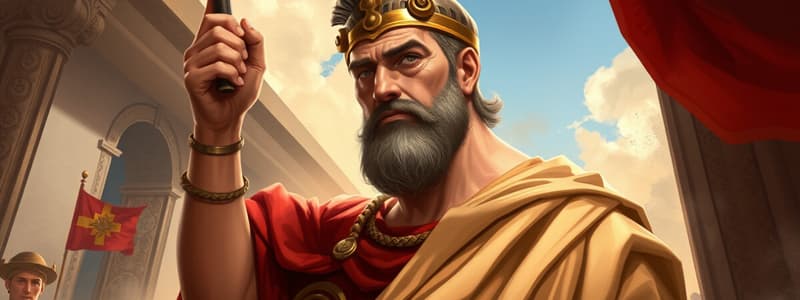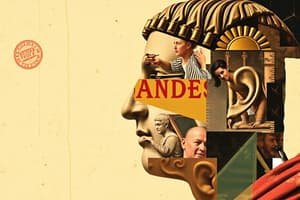Podcast
Questions and Answers
Which philosophical school is closely associated with Cicero's thoughts?
Which philosophical school is closely associated with Cicero's thoughts?
- Skepticism
- Stoicism (correct)
- Pyrrhonism
- Epicureanism
What was one of the primary teachings of Stoicism?
What was one of the primary teachings of Stoicism?
- The capabilities of individual emotions.
- The denial of physical matter.
- The importance of sensory pleasure.
- The identification of nature with an immanent God. (correct)
According to Stoic philosophy, what is considered the supreme good?
According to Stoic philosophy, what is considered the supreme good?
- Wealth and prosperity.
- Virtue. (correct)
- Knowledge and wisdom.
- Emotional fulfillment.
What role does ethics play in Stoicism?
What role does ethics play in Stoicism?
Whom did Cicero visit that was associated with Stoicism?
Whom did Cicero visit that was associated with Stoicism?
What is the primary argument made regarding unjust laws?
What is the primary argument made regarding unjust laws?
According to the content, what distinguishes a just law from an unjust law?
According to the content, what distinguishes a just law from an unjust law?
What stance does Augustine take on unjust laws?
What stance does Augustine take on unjust laws?
How does the text suggest one should respond to an unjust law?
How does the text suggest one should respond to an unjust law?
What role does 'tension' play in the context of nonviolent direct action?
What role does 'tension' play in the context of nonviolent direct action?
What can be inferred about the relationship between segregation laws and human personality?
What can be inferred about the relationship between segregation laws and human personality?
Who is referenced in the content as having similar views to breaking unjust laws?
Who is referenced in the content as having similar views to breaking unjust laws?
Why is it said that individuals must confront issues of injustice?
Why is it said that individuals must confront issues of injustice?
What does the reference to natural law and equity in Rhetoric to Herrenius indicate about Roman law?
What does the reference to natural law and equity in Rhetoric to Herrenius indicate about Roman law?
How was the notion of equity interpreted in Roman law before its integration into aequitas?
How was the notion of equity interpreted in Roman law before its integration into aequitas?
What was Cicero’s primary contribution to the reflections on justice and equity?
What was Cicero’s primary contribution to the reflections on justice and equity?
What does Cicero's view on virtue suggest according to De Republica?
What does Cicero's view on virtue suggest according to De Republica?
How did Cicero's involvement in politics ultimately affect his career?
How did Cicero's involvement in politics ultimately affect his career?
What was Cicero's stance on the relationship between law and ethics?
What was Cicero's stance on the relationship between law and ethics?
What can be inferred about the Stoic influence on Cicero's philosophy?
What can be inferred about the Stoic influence on Cicero's philosophy?
What key event marked a notable achievement in Cicero's political career?
What key event marked a notable achievement in Cicero's political career?
Flashcards
Cicero's Political Alignments
Cicero's Political Alignments
Cicero initially sided with Pompey, then aligned with Octavian against Mark Antony, leading to his assassination.
What is Stoicism?
What is Stoicism?
A philosophical school in the 3rd century BC, founded by Zeno of Kition, emphasizing interconnected logic, science, and ethics.
Stoic Materialism
Stoic Materialism
The belief that everything is composed of matter, including the soul.
Stoic Pantheism
Stoic Pantheism
Signup and view all the flashcards
Aim of Nonviolent Direct Action
Aim of Nonviolent Direct Action
Signup and view all the flashcards
Unjust Laws
Unjust Laws
Signup and view all the flashcards
Cicero's Legal Integration
Cicero's Legal Integration
Signup and view all the flashcards
Cicero's Definition of Law
Cicero's Definition of Law
Signup and view all the flashcards
Cicero and Equity (aequum)
Cicero and Equity (aequum)
Signup and view all the flashcards
Cicero's View on Virtue
Cicero's View on Virtue
Signup and view all the flashcards
Who was Cicero?
Who was Cicero?
Signup and view all the flashcards
Stoic Ideal of Virtue
Stoic Ideal of Virtue
Signup and view all the flashcards
Study Notes
Cicero's Political Life
- Cicero was amnestied after a year and returned to Rome, though his political comeback was unsuccessful.
- He sided with Pompey during the Caesar-Pompey conflict starting in 50 BC, leading to his withdrawal from politics post-Caesar's victory in 48 BC.
- After Caesar's assassination, Cicero aligned with Octavian against Mark Antony, resulting in his assassination by Antony in 43 BC.
Stoicism and Natural Law
- Stoicism emerged in the 3rd century BC with Zeno of Kition as a philosophical school emphasizing the interconnectedness of logic, natural science, and ethics.
- Key Stoic beliefs include materialism (everything is matter, including the soul) and pantheism (identifying nature's order with God).
- The Stoic ideal centers on virtue related to reason, promoting actions justified by reason within a rational and intelligible order of nature.
Nonviolent Direct Action and Justice
- Nonviolent direct action aims to create tension in society to address issues that have been ignored.
- Those who break unjust laws do so openly and accept penalties to arouse public conscience regarding injustice.
- Just laws align with moral law, whereas unjust laws conflict with it, as stated by figures like St. Augustine and St. Thomas Aquinas.
Cicero's Influence on Roman Law and Doctrine
- Cicero's work integrates Greek reflections on justice into Roman law, which traditionally focused on formalism and technicality while excluding ethical considerations.
- His writings advocate for a broader definition of law, incorporating natural law, customs, equity, and contracts, significantly influencing Roman legal thought.
- The notion of equity (aequum) evolves within Cicero's framework, allowing for more adaptable applications of law compared to rigid civil codes.
Cicero's Background and Contributions
- Born in 106 BC, Cicero hailed from a plebeian family and became a prominent Latin author and Stoic philosopher.
- Emphasized the practical application of virtue in governance, asserting that true virtue is exercised through participation in political life.
- Gained fame as a lawyer, consular figure, and for thwarting the Catilinian conspiracy, which later led to his exile due to a law against executing citizens without trial.
Studying That Suits You
Use AI to generate personalized quizzes and flashcards to suit your learning preferences.




